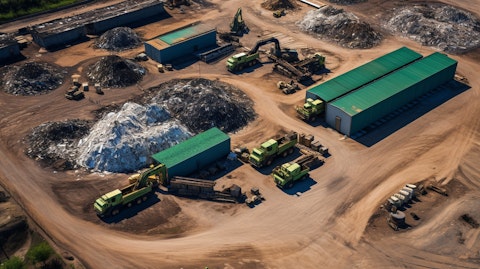We recently published a list of the 10 Best Environmental Stocks To Invest In Right Now. In this article, we are going to take a look at where Waste Management, Inc. (NYSE:WM) stands against the other best environmental stocks to invest in right now.
The United Nations Climate Change Conference (COP29), held in Baku, Azerbaijan, concluded on November 24, with a landmark agreement that sets a new collective goal for climate finance. The agreement, which aims to triple the annual finance to developing countries from the previous goal of $100 billion to $300 billion by 2035, marks a significant step forward in global efforts to combat climate change and support vulnerable nations. Furthermore, this new finance goal, known as the New Collective Quantified Goal (NCQG) also aims to scale up collaboration among all actors including governments, private sector entities, and international financial institutions to finance developing countries to reach $1.3 trillion annually by 2035.
The progress made at COP29 builds on the global climate action achieved at previous conferences. COP27 established a historic Loss and Damage Fund, while COP28 delivered a global agreement to transition away from all fossil fuels in energy systems swiftly and fairly, tripling renewable energy and boosting climate resilience. The new finance goal at COP29 is a crucial step in ensuring that these commitments are met and that the global community remains on track to limit global warming.
According to a report by McKinsey, the $300 billion annual goal for climate financing falls drastically short of the estimated $1 trillion needed annually to meet global targets. On a broader scale, McKinsey estimates that up to $9 trillion per year will be required globally by 2050 to decarbonize physical assets and transition towards a sustainable future.
The report highlights that private capital is widely seen as a key enabler in bridging this financing gap. However, many investors remain cautious, not just due to a lack of funds, but due to a shortage of credible, scalable investment opportunities, execution challenges, insufficient risk management, and delays in scaling operations. The geopolitical and macroeconomic environment further complicates the sustainability landscape. Higher interest rates, inflation, and energy supply disruptions have created an environment where cost assumptions from just a few years ago no longer hold true.
In light of these dynamics, McKinsey identifies three key strategies for businesses to navigate the complex investment landscape in sustainability. First, companies must reevaluate and refresh sustainability strategies as past assumptions may no longer be valid, and companies must take a pragmatic approach to align their strategies with current realities. Second, businesses must accelerate climate technology industrialization. While renewable energy technologies have made significant progress in cost competitiveness, other emerging technologies, such as hydrogen, long-duration energy storage, and precision fermentation, require further industrialization. Third, companies must address execution risks, streamline supply chains, and ensure they have experienced teams capable of managing large-scale sustainable projects.
The report concluded by emphasizing that companies who will act decisively, embrace innovative financing mechanisms, and prioritize operational excellence will not only contribute to global sustainability goals but also position themselves for future growth in an evolving economic landscape.
The journey towards a sustainable future requires collaboration, innovation, and accountability across all sectors. While the challenges are significant, the opportunities for growth, resilience, and value creation are even greater.

Aerial view of a Waste Management Transfer Station, highlighting the scale of its operations.
Our Methodology
To compile our list of the 10 best environmental stocks to invest in right now, we used environmental ETFs plus online rankings to compile an initial list of 20 environment-friendly companies. We then used Insider Monkey’s Hedge Fund database to rank 10 stocks according to the largest number of hedge fund holders, as of Q3 2024. The list is sorted in ascending order of hedge fund sentiment.
Why do we care about what hedge funds do? The reason is simple: our research has shown that we can outperform the market by imitating the top stock picks of the best hedge funds. Our quarterly newsletter’s strategy selects 14 small-cap and large-cap stocks every quarter and has returned 275% since May 2014, beating its benchmark by 150 percentage points (see more details here).
Waste Management, Inc. (NYSE:WM)
Number of Hedge Fund Investors: 54
Waste Management, Inc. (NYSE:WM) is one of the largest providers of waste collection, disposal, and recycling services, serving over 20 million customers across the United States and Canada. The company is a leader in sustainable waste practices, including waste-to-energy initiatives, methane gas recovery, and advanced recycling technologies. Waste Management, Inc. (NYSE:WM) actively reduces greenhouse gas emissions and minimizes landfill dependency.
Waste Management, Inc. (NYSE:WM) is actively investing in sustainability initiatives and renewable energy projects to drive growth and reduce its environmental footprint. The company has committed to spend approximately $3 billion on sustainability-related investments, including the development of renewable natural gas (RNG) projects, recycling facilities, and other initiatives. These investments are expected to generate significant earnings growth and free cash flow, with the company anticipating $800 million in EBITDA from these initiatives by 2027.
Waste Management, Inc. (NYSE:WM) is also leveraging technology and automation to optimize its operations, improve efficiency, and reduce costs. The company has implemented various technologies, including automated routing systems, scheduling and planning tools, and advanced mapping systems, to streamline its collection and disposal operations. Additionally, Waste Management, Inc. (NYSE:WM) has automated over 800 routes in its residential fleet to reduce labor dependence and improve performance. These investments in technology are expected to drive margin expansion and operating efficiency, with the company targeting a significant reduction in operating expenses as a percentage of revenue.
Waste Management, Inc. (NYSE:WM) is also pursuing strategic acquisitions to expand its service offerings and increase its market share. On November 4, the company completed the acquisition of Stericycle, a leading provider of medical waste management services. This acquisition is expected to add a complementary business line and drive growth through synergies and expanded service offerings.
Overall, WM ranks 3rd on our list of best environmental stocks to invest in right now. While we acknowledge the potential of WM to grow, our conviction lies in the belief that AI stocks hold greater promise for delivering higher returns and doing so within a shorter time frame. If you are looking for an AI stock that is more promising than WM but that trades at less than 5 times its earnings, check out our report about the cheapest AI stock.
READ NEXT: 8 Best Wide Moat Stocks to Buy Now and 30 Most Important AI Stocks According to BlackRock.
Disclosure: None. This article is originally published at Insider Monkey.





